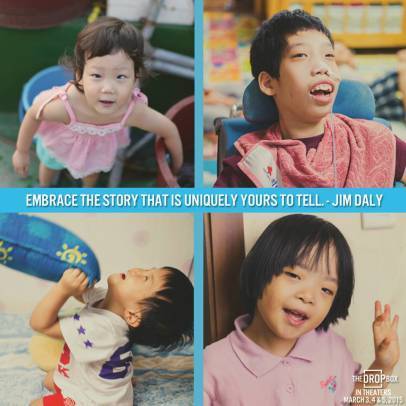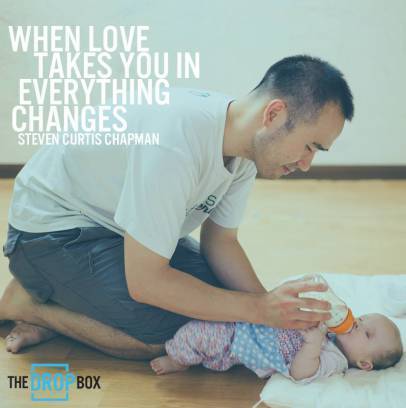The Drop Box film. Why it’s complicated, why it matters, and why you should watch it.
It’s true. The topics of orphan care and adoption are incredibly complex. Anyone that says otherwise are naive or selling something. It’s complicated on their own and even more complicated in the same sentence. And even more complicated when you engage it on local, national, and international level. They might be undergirded by certain same principles but they can (and should) look different on the ground. There’s no one simple, generic solution. And whenever solutions are presented, eventually – surely enough – loopholes are found to be exploited or what’s relevant in one context and culture may not be as relevant – or even dangerous – in another context.
Adoption – locally and globally – are fraught with complexities and even justice issues. It’s sad but that is sometimes the case when people [in this case, adoptees and especially young children/babies] are seen as commodities – particularly in international adoption. When we speak about adoption or orphan care, we must begin with two overarching principles for us as followers of Christ: 1) God cares for children and thus, 2) Children must matter to us – their well being, their safety, their future. But often times, children themselves are often what’s most forgotten in these conversations, complexities, and politics.
Having said that – and while others may disagree with me, my conviction about international adoption is that we must seek to keep children with their biological families if at all possible and children are safe. This needs to be the pervasive ethic so that money isn’t the ruling factor – especially with international adoption.
Now, having said that, we know that we don’t always live in a society and culture of ideals and thus, the tension. This is why orphan care and adoption require much prayer, discernment and critical thinking.
This leads me to a film that I’d like to encourage you to watch: The Drop Box.
The Drop Box is a powerful documentary coming to theaters in March of 2015.
The film tells the story of Lee Jong-Rak, a pastor in Seoul, South Korea, and his wife, who built a drop box at the front of his church as a safe location for babies who are otherwise abandoned on the streets. It has an inspiring message for all of us, challenging us to consider what role we might play in advocating for orphans and supporting adoptive families.
If you live in Seattle and the Puget Sound, please be my guest for a special premiere screening event with other pro-life, adoption, and leaders from around the region. The event starts at 7 pm. Seats are limited; registration is first come, first served. [Poster Invitation]
What I deeply appreciate about The Drop Box film (I saw it couple months ago) is that not only does it acknowledge the complexity of these issues, it reminds us – beautifully and poignantly – that behind statistics and banter of issues – are real babies and infants that are created in the image of God. This needs to be a constant reminder lest we think this is just about policies, politics, and institutional systems. Life matters. Babies matter. Unborn babies. Infants matter. Children matter.
And in a world and culture that tend to gravitate towards superhero figures, this is a beautiful reminder of the story of an ordinary person, Pastor Lee and his wife, and their willingness to live with a commitment to compassion and obedience to Christ – even at deep personal costs. Having been a pastor for couple years in Korea in the ’90s, I can tell you that there’s a certain allure of big and glamorous churches led by well known and glamorous pastors. And you don’t achieve that by caring for orphans abandoned on the streets.
Why is this film so powerful?
Because it speaks to the value and beauty of human life – every single human life including babies and toddlers that make up most of the orphans in Pastor Lee’s care: “disabled children.” In every part of the world, kids with physical disabilities are seen and judged instantly as second-class and disposable. This is why in many western countries, some sources cite 80-92% of unborn babies that are detected with Down Syndrome are aborted.
Let that sink in.
This is why this film matters.
It acknowledges the complexities.
It acknowledges cultural tensions and apathy.
It acknowledges the dangers and ethics of how having a drop box enabling mothers and fathers to drop off their babies.
But however complicated, we can’t just talk ethics, complexities and politics…and ignore the facts of aborted unborn babies and unwanted babies
This is why this film matters.
Because it declares that every life matters – even and especially the unwanted and disposable.
This is a glimpse of the Gospel.
This is a glimpse of the Kingdom.
This is a glimpse of the Gospel that declares that God sees us, meets us, and adopts us as sons and daughters.
Thank you, Pastor Lee. Thank you, Mrs. Lee.
목사님 – 사모님, 감사합니다.



Tagged: pastor lee jong-rak, the drop box film

Eugene Cho's Blog
- Eugene Cho's profile
- 59 followers



